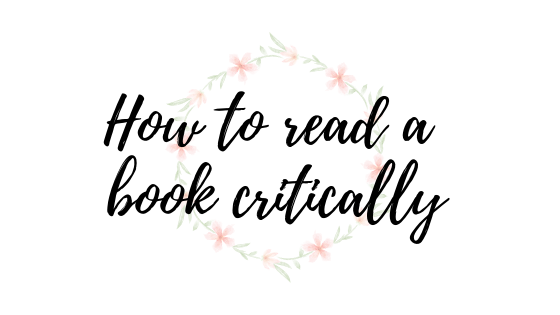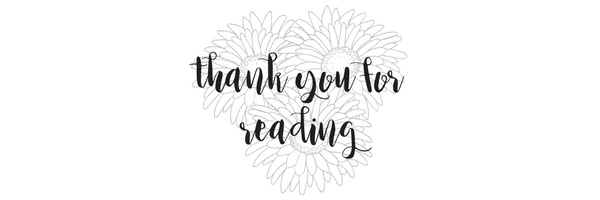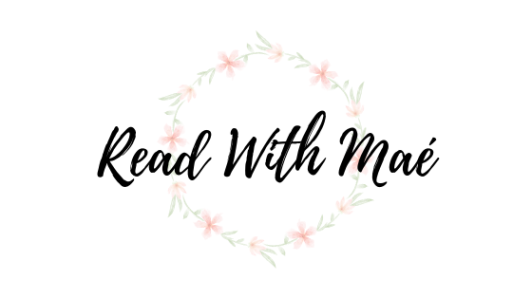
Hi everyone!
Today’s post will be a little guide on how to read a book critically. I obviously don’t claim to be an expert, but these are some things I learned since I joined the book community. I still have a lot to learn, but I hope that this post will be helpful to you if you’re new to the community or reviewing books!
There are some books in the Teens/YA section that can be called “problematic”. So first thing first, in what way a book can be problematic?
- it contains bigotry of any kind (racism, homomisia, sexism, etc.) and it’s not challenged
- some words are ableist
- it perpetuates stereotypes (ex: the angry black girl, the slutty bi girl)
- it glorifies or romanticizes mental illness
- etc
This isn’t a definitive list of what makes a book problematic, just some of the most notifiable examples.
So let’s get into it. Here are some of my advices on how to read a book critically! (This is from my experience and from what I learned).
First of all, know the problematic tropes
The first thing you need to have in mind while reading a book are the tropes that are *very* likely to turn out problematic. You can find these on many reviews, but here are some examples:
- The slightly bad/mysterious love interest: when it’s well done, it’s actually one of my fav tropes. But beware of the abusive relationship that is very likely to come up. (example: Book Review: Roar – Read at Midnight)
- The white savior: of course, we all want to be that generous, brave character that saves everyone. But pay attention: too often, this trope falls into something rooted in racism and colonialism: the white, kind, brave hero who saves PoCs that obviously need saving and can’t do this by themselves, they just NEED that one white character. (example: Daenerys Targaryen)
- The male love interest who cures the girl who suffers from mental illness: more commonly called “How To Discredit Mental Illnesses and Ignore Their Real Impact”. This time I’ll give an example where it was well done: Under Rose-Tainted Skies by Louise Gornall. I was really scared reading this book because of this trope, but even though the two lovers end up together, the MC continue to struggle with her MI, and love do not just erase her struggles.
- etc.
Set your radar of “problematic things” on
Once you know some of the problematic tropes, it will be easier to see things coming. Some situations just announce themselves. Sometimes you’ll be agreeably surprised, and some other times you’ll unfortunately be right.
What I do is every time I read a word that can be controversial if not treated properly (ex: race, body, gay, etc.), I pay closer attention. I reread the same sentence 5 times if needed. Especially since English isn’t my first language, I sometimes need to concentrate more if I want to get the real sense between words.
The thing is, it’s easy to identify problematic things when reading a review calling them out. These contain explanations on why some aspects are problematic, which is not present in books, of course.
This leads to my 3rd advice:
Talk with your friends
We are all different. Some of us experienced racism, other homomisia, other mental illnesses. And by our experience, we do not all have the same sensibility to every topics. For example, I’m more likely to identify problematic things related to mental illnesses, since I suffer from several of those. And since I’m white, I’m less likely to identify problematic things related to racism, since I’ve never experienced it.
That’s where your friends can be useful. Or even the book community. What I do when in doubt is come to my friends for advice when I’m not sure if something is problematic or not. Or I tweet something like: “Hey, I’m reading (some book) and something is bothering me but I’m not sure if it’s problematic, can someone help me?”. Since the book community contains a lot of different people, you’re likely to find your answer.
BUT! Two things not to do:
- Ask one blogger to help you with an issue everytime you have doubts. They are not here for this, and sometimes it can be triggering/exhausting for them. To see themselves misrepresented (if they share one identity with a character from the book you’re reading) is not something you want to see everyday.
- Assume that, because one friend from the minority targeted told you it’s not problematic, everyone has to agree with them. Minorities are not a monolith. Experiences can be different, and not everyone has the same opinion on one thing.
Don’t forget to talk about it
It’s great, you have finally sharpened your mind and you’re aware of things that can set up the alarm, congratulations!
But if you’re not going to talk about it, it’s worth nothing. If you’ve read a “problematic book”, even if you enjoyed it, your duty as a blogger is to talk about it. If you’re going to give the book 5 stars anyway, well, you failed at your job as a blogger.
Whether you have a blog, tumblr, goodreads, instagram etc, it’s very likely that people are reading what you’re saying. What we don’t want to happen if someone reading a book that they saw being attributed 5 stars and end up being hurt because of misrepresentation.
Reminder: you can love something problematic and still being critical
It’s totally okay. You have every right to enjoy a book. Especially if it helped you in dark times of your life. But you have to be aware of the hurt it can cause to others. We just have one request: acknowledge it.
For example, I love Game of Thrones. It’s one of my favorite shows. And I can’t list aaaaaall the problematic aspects of it. While enjoying it, I’m still calling out these aspects (look up, I just called out Daenerys Targaryen).
Soooo. I hope I’m not forgetting something important. If I did, do not hesitate to tell me in the comments! And don’t forget that this is from my experience and that I have still a lot to learn. We all probably do.
- Tell me your little secret: what problematic book/show/movie did you enjoy?
- Did this post was useful to you?
- What do you do when you come across something hurtful in a book?
Previous post:
Tips For A Blogger #1: How To Read Efficiently


This was a wonderful post Mae. I loved how you pointed out what problematic means and how to identify them. In my opinion, I believe that in order to read books critically it is important to diverse books (and I am not simply talking about diversity in terms of race or religion or sexuality) and to talk to people from such communities. Reading reviews by diverse book reviewers also helps tons. At the end of the day, talking about books is just as important as reading them.
LikeLike